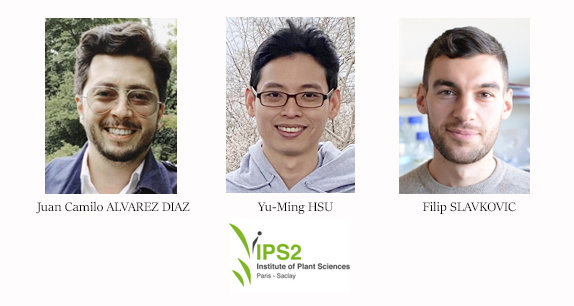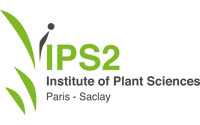PhD theses defended at IPS2 during summer 2022
Juan Camilo ALVAREZ DIAZ
Genomic and epigenomic immunity in common bean (Phaseolus vulgaris): lessons learned from chromosome scale genome assemblies
Keywords: Phaseolus vulgaris, genome assembly, resistance genes
Common bean is the most consumed grain legume in the world for human feeding. Two available genome assemblies allowed to identify RNA silencing genes in bean, some of which are induced after infection by Colletotrichum lindemuthianum, and to perform a transcriptomic analysis revealing the importance of the defense proteins PR10/Bet-V1 after infection. Furthermore, to study the evolution of repeated sequences (NLR and satellite DNA), we generated highly contiguous assemblies for two genotypes using PacBio HiFi sequencing and Hi-C scaffolding. Within the NLR clusters, important structural variations were observed between genotypes, as well as methylation polymorphism for NLRs in the Co-2 resistance cluster. Finally, we identified a transposable element (TE) inserted in the candidate NLR gene encoding for a resistance gene to BCMV, and likely corresponding to a recent insertion.
Defense date: July 21, 2022
Supervisors: V. GEFFROY and A. GRATIAS-WEILL
Yu-Ming HSU
Mining genetic diversity for tomorrow’s agriculture
Key words: biostatistics, computation, statistical inference, plant breeding
Genetic diversity is the key ingredient fueling gains in plant breeding. Thus, understanding the structure of a germplasm’s genetic diversity and the factors shaping it pave the way for crop improvement. We used quantitative modeling and bioinformatic approaches to study meiotic recombination and the genetic diversity of two important crops, tomato and peanut. For meiotic recombination, a summarized epigenetic status, the levels of single nucleotide polymorphisms (SNPs), and the size of intergenic regions, were integrated into a quantitative model that reproduces much of the variation seen in the experimental crossover data. We also quantified the genetic diversity of Taiwanese peanut accessions, and identified a candidate gene contributing to the resistance against bacterial wilt in tomato. These investigations in fundamental biology and applied breeding science provide new insights that can help future strategies for crop improvement.
Defense date: September 7, 2022
Supervisors: M. FALQUE and O. MARTIN
Filip SLAVKOVIC
Genetic and -omic analysis of nectary development: identification of key traits for improvement of foraging activity
Keywords: Cucumis melo L., flower, nectar, nectary, pollinators
Nectar is the key reward that plants use to outsource pollination services and ensure reproductive success. The nectar-secreting organs, the nectaries, play the central role in maximizing seed set, however, the molecular mechanisms underlying their development remain understudied. The thesis project allowed improving our understanding of nectary development and nectar secretion in relation with pollinator foraging, key traits that impact fruit yield, its stability and food availability for bees. First, accessions of melon that differ in nectary development, nectar secretion and their effects on bee visitation, were phenotypically characterized. Second, the gene networks controlling nectary development in unisexual flowers were studied. Third, the impact of the genetic concepts identified on the foraging activity and behavior of bees was validated. The challenge is now to link the genetic model to nectar-related traits to enhance crop-pollinator interactions.
Defense date: September 16, 2022
Supervisors: A. BENDAHMANE and C. DOGIMONT

22/11/2022
